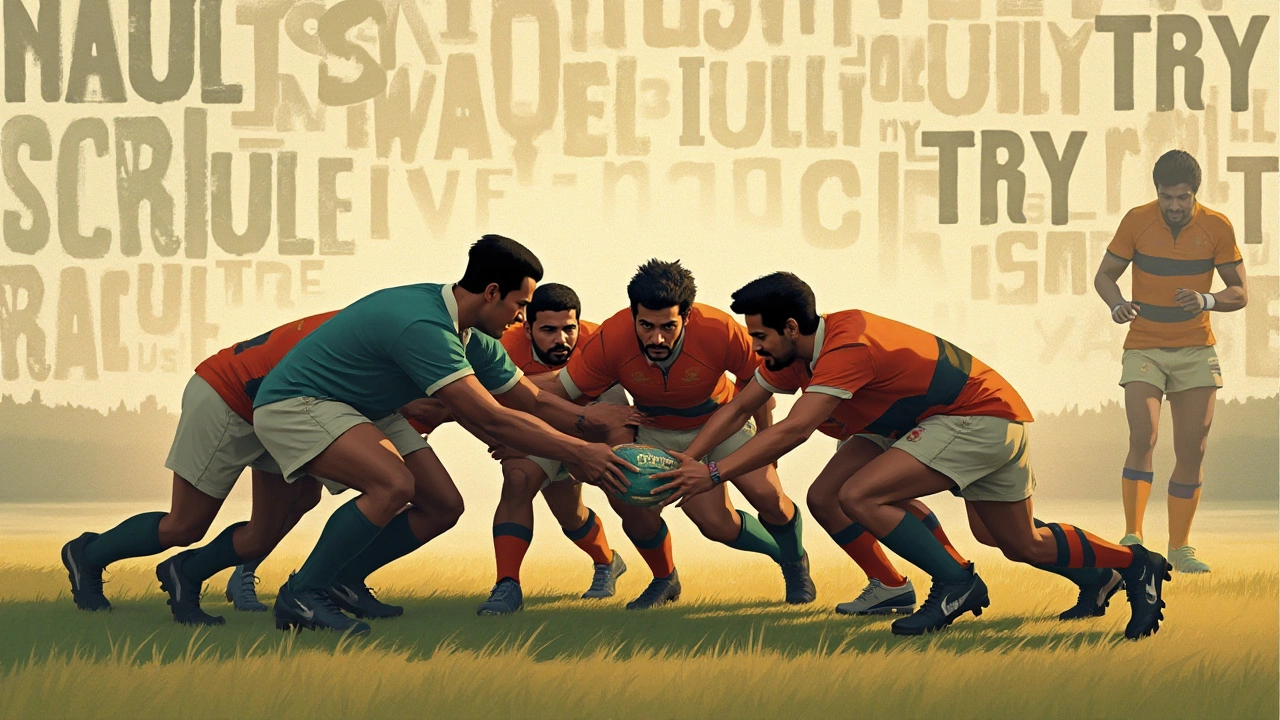Rugby isn’t just about swift moves or sheer strength; it’s a game rich in heritage and marked by a distinct verbal flair. For those new to the sport, the vibrant lingo can seem as tough to tackle as a full-on ruck. Yet, unraveling these terms can add a whole new layer of enjoyment and understanding when you’re watching a match or chatting with fellow fans. From traditional expressions rooted in the history of the game to the informal slang that players toss around, rugby’s language is as dynamic as it is fascinating.
This article aims to demystify some of the most commonly used rugby slang, giving you a leg up whether you're on the field or enjoying the sport from the stands. We’ll explore the origins of various terms, break down key phrases you’re likely to hear during a game, and share practical tips for quickly picking up the lingo. Let’s get ready to dive into this unique aspect of rugby culture.
- The Origins of Rugby Slang
- Common Rugby Terms You Should Know
- The Culture and Use of Slang in Rugby
- Tips for Learning Rugby Vocabulary
The Origins of Rugby Slang
To truly appreciate rugby slang, it’s crucial to look back at the history of rugby itself. Rugby originated in the early 19th century at Rugby School in Warwickshire, England, and has grown to become one of the most popular sports worldwide. The development of the game, steeped in tradition, significantly influenced the colorful vocabulary we hear today. As players and fans gathered to celebrate the sport, a unique dialect began to emerge. These terms not only served to communicate quickly during the heat of the match but also provided a sense of community among enthusiasts.
A major factor in the evolution of rugby slang has been the game’s global reach. As rugby spread from its English roots to countries like New Zealand, Australia, and South Africa, each culture added its own twists to the language. This blend of expressions reflects the cultural diversity and the international nature of rugby. For example, in New Zealand, terms like "haka"—a traditional Maori dance performed by players before a match—illustrate how local customs merge with international rugby traditions to create a shared language that is both unique and universal.
The language of rugby is not static; it evolves with each passing season. Players and coaches frequently adapt jargon to suit new strategies and plays. What might have once been an elite code known only to those who laced up their boots now percolates into popular culture. In the words of renowned journalist and rugby enthusiast John Hopkins, "Language is the very fabric of rugby; it's how the game talks to itself. It's not just nonsense; it's the sound of history, culture, and raw passion colliding on the field."
Language is the very fabric of rugby; it's how the game talks to itself. It's not just nonsense; it's the sound of history, culture, and raw passion colliding on the field. — John Hopkins
Ranging from the poetic to the pragmatic, rugby's distinctive phrases can often bewilder newcomers. Terms like "scrum," "try," and "ruck" each carry a meaning ingrained deep in the sport's tactics and ethos. In fact, the term "scrum" itself is derived from the word "scrummage," highlighting how formal language shifts into casual vernacular. The word "ruck" refers to the formation that happens when the ball is on the ground and players compete fiercely to gain possession—a clear reflection of the intensity and energy embodied in these words.
Unwrapping the origins of rugby slang not only demystifies the sport’s complex vocabulary but also enriches one’s understanding of the game. It's an invitation to dive deeper into the stories embedded in each term. Just as the tactics on the field tell the narrative of a match, the language around rugby reveals its broader journey from the muddy fields of England to sunny stadiums worldwide. Recognizing these roots enhances our appreciation and brings us closer together, knitting a global tapestry of fans bonded by common passion and vivid lingo.

Common Rugby Terms You Should Know
Diving into the world of rugby is like learning a new language, one that adds layers of depth to the game itself. Among the myriad terms that pepper conversations around the field, a few stand out due to their frequent use and significance. Understanding rugby terms not only enhances your appreciation for matches but also helps you engage with the sport on a more intimate level. Take, for example, the term 'scrum', which refers to a method of restarting play involving players packing closely together with their heads down, a spectacle that's as much about strategy as it is about strength. This move is a hallmark of rugby, showcasing the sport's unique blend of coordination and chaos.
Another essential word in the rugby vocabulary is 'ruck', which occurs after a tackle when players from each team compete for the ball. This moment is fraught with tension and demands incredible teamwork and quick thinking. Then there's the 'maul', a fierce show of muscular force where players bind together around the ball, attempting to drive it toward the goal. Distinct from rucks, mauls continue to move, providing a dynamic and strategic component to the game.
It’s also worth mentioning terms like 'line-out' and 'knock-on'. A line-out is used to bring the ball back into play after it has gone into touch, akin to a throw-in in soccer, but involves players being lifted into the air to catch the ball. The 'knock-on', meanwhile, is a mishap where the ball is accidentally knocked forward, resulting in a scrum to the opposing team. Each term, while seemingly simple, carries a wealth of tactics and tradition that have developed over decades.
Use of rugby slang extends to fan interactions and commentary. Words such as 'ankle-tap', a last-ditch effort to trip up an opponent, or 'hospital pass', a pass that leaves the receiver vulnerable to a heavy tackle, are peppered in casual conversations. These terms, colloquial and vivid, capture the rugged spirit of the game. Rugby has even inspired famous quotes, like one from legendary player Bill McLaren, who said, "Rugby is a hooligan’s game played by gentlemen." Such words speak to the deep camaraderie and respect inherent in rugby culture.
For those keen on diving deeper, here’s a quick table of additional terms and their meanings:
| Term | Meaning |
|---|---|
| Drop Goal | A goal scored by kicking the ball through the posts during open play. |
| Garryowen | A high, hanging kick giving advancing players time to contest for the ball. |
| Blindside | The shorter side of the field when a scrum or line-out is not in the center. |
| Fly-half | The playmaker in a rugby team who often dictates the flow of the game. |
Delving into these terms enriches the fan experience, transforming observations into understanding. As you explore each word and its practical use on the field, your knowledge becomes a ticket to appreciating the finer nuances of rugby, connecting you with a global community passionate about this thrilling sport. It’s more than just words; it’s about engaging with a cultural phenomenon that has captivated millions around the world.

The Culture and Use of Slang in Rugby
Rugby is not just a sport but an immersive culture, deeply embedded with its unique words and phrases. The language of rugby, much like the game itself, is fast-paced and dynamic. Slang in rugby serves to enhance camaraderie among players and fans, creating an exclusive club where those familiar with the terminology can engage more deeply. The use of rugby slang reflects the sport's vibrant heritage and often mirrors its rough and tumble essence. Expressive terms such as "scrum" and "ruck" are peppered with historic significance, each holding tales of the game's evolution.
It's fascinating to uncover how some of these terms originated or were co-opted from everyday language. For example, "scrum," deriving from "scrummage," echoes military formations, reflecting the strategic and collective nature of the play involved. The slang not only serves as shorthand for intricate play but also carries the weight of tradition. Using these terms, players perform a kind of ritual, invoking the spirits and strategies of games long past while carving new stories into the living history of rugby.
Some commentators believe that this specialized vocabulary boosts morale and strengthens team unity. As one rugby coach once remarked, "Speaking the language of the field connects us in a way that skills alone can't."
"Rugby slang is a glue that binds players and fans, creating an identity that speaks beyond mere words."Such expressions are loaded with meaning; they help the team communicate under pressure while reminding them of their shared purpose and collective spirit.
Beyond its use within the confines of the field, rugby slang spills into the stands, where fans shout and bond over every phase of play. This attachment is not just emotional but also intellectual, as fans delight in understanding and even creating new terms, keeping the language of rugby alive and evolving. The casual banter around the game fosters a sense of belonging, creating a community bonded by a common vocabulary. This shared language is a powerful tool for identity, bridging generations and bringing diverse fan groups together.
For newcomers to rugby or those peering in from the sidelines, grasping this slang can feel like unlocking a secret code. Yet, it's a rite of passage that quickly turns spectators into participants, drawing them into the narratives spun around each match. This wordplay is as integral to the experience as the game itself, echoing the sounds of boots thudding against the pitch and the roar of the crowd. These spoken words carry the passion, intensity, and spirit of rugby, ensuring the sport is as much about human connection as it is about athletic prowess.

Tips for Learning Rugby Vocabulary
To truly appreciate and enjoy rugby, it's helpful to be familiar with the rugby vocabulary that makes the sport so unique. Whether you're a player or a fan, understanding the language of the game can greatly enhance your experience. First, consider immersing yourself in rugby culture as much as possible. This means watching games regularly, as hearing the commentators use terms like 'maul', 'scrum', and 'try' can build your familiarity with the rugby terms. Additionally, engaging in conversations with seasoned fans can provide context and clarity to words you might not yet understand. You might also find reading rugby-related articles or books beneficial, as they often contain explanations or anecdotes that shed light on the sport's unique lingo.
Using interactive tools like rugby glossaries or mobile apps designed to teach rugby slang can also be a fun and effective way to learn. Many of these resources offer quizzes and challenges that test your knowledge and keep learning engaging. Additionally, joining a local rugby club, if possible, presents a firsthand opportunity to learn from others. Participating in practice sessions or attending club meetings helps integrate you into the community, where rugby language is alive and evolving. As rugby has variations across the world, like Rugby Union and Rugby League, understanding these distinctions in vocabulary can be crucial for accurate usage and comprehension. Indeed, some sports websites offer in-depth breakdowns of these differences, which can be invaluable as educational resources.
Practice makes perfect, and using the vocabulary in conversations is key. Don’t hesitate to use new terms when discussing the game or describing what you see on the field. It helps solidify your understanding and gives you confidence. A good practice is to write down or note unfamiliar words you encounter during a match and research them later. This not only augments your vocabulary but ensures that you use the rugby language properly.
"Learning language is a by-product of an engaging activity," noted Ralph K. White, renowned for his insights into motivated learning, emphasizing how involvement and interest in the subject accelerate comprehension.
Keep in mind that the world of rugby slang is not stagnant—new slang emerges as the culture evolves. Therefore, staying updated by participating in forums or following rugby news can enrich your vocabulary continually. Technology, such as video-on-demand services, allows you to pause and replay pivotal moments in games, providing additional learning opportunities, especially if you pair this with commentary or expert analysis. Additionally, engaging in social media platforms dedicated to rugby discussions can expose you to different uses of terms worldwide.

